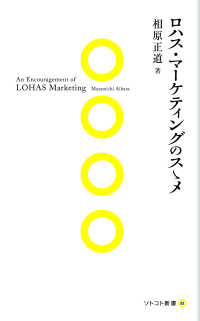- ホーム
- > 洋書
- > 英文書
- > Literary Criticism
Full Description
New perspectives on the relationship - or the perceived relationship - between the German language and the causes, nature, and legacy of National Socialism and the Shoah.
There is seemingly no escaping the association of the language of Goethe with the language of Hitler: the two leaden clichés seem to be inseparable, suggesting a Sonderweg between enlightened sophistication and subtle beauty on the one hand and linguistic barbarism on the other. Victor Klemperer suggested that the Lingua Tertii Imperii was a perversion of German that needed to be purged from the language, but does the notion of "Nazi language" as an identifiably separate entity really hold water, or does it only reflect a desire to construct a clear demarcation line between "Germans" and "Nazis"? What new linguistic, literary, or historical perspectives are availableon the functioning of language during and after the Third Reich? Must German always be the "language of the perpetrators," entailing a constant state of heightened self-awareness or vigilance against contamination, or is neutral,objective speech about National Socialism possible in German?
This collection provides new perspectives on the relationship - or the perceived relationship - between the German language in all its manifestations and the causes, nature, and legacy of National Socialism and the Shoah.
Contributors: Ian Biddle and Beate Müller, Mary Cosgrove, Peter Davies, Sylvia Degen, Andrea Hammel, Geraldine Horan, Teresa Ludden, Dora Osborne, Marko Pajevic, James Parsons, Simone Schroth, Arvi Sepp, Simon Ward, Jenny Watson.
Peter Davies is Professor of Modern German Studies at the University of Edinburgh. Andrea Hammel is Senior Lecturer in German at Aberystwyth University.
Contents
Introduction: The German Language, National Socialism, and the Shoah
German Language and National Socialism Today: Still a German "Sonderweg"?
Clear Wording or "Historical" Euphemisms? Conceptual Controversies Surrounding the Naming of National Socialist Memorial Sites in Germany
"Lieber, guter Onkel Hitler": A Linguistic Analysis of the Letter as a National Socialist Text-Type and a Re-evaluation of the "Sprache im/des Nationalsozialismus" Debate
"German was heard so often in our Dutch home": German Nazi Refugees in the Netherlands and Their Ambivalent Relationship with Their Mother Tongue
"Whose text is it anyway?" Influences on a Refugee Memoir
Stigma and Performance: Victor Klemperer's Language-Critical Reflections on Anti-Semitic Hate Speech
Reinventing Invented Tradition: Vergangenheitsbewältigung and the Literature of Melancholy
"Even the word 'und' has to be re-invented somehow": Quoting the Language of the Perpetrators in Texts by Anne Duden
"Reden ist Silber, Schweigen ist Gold": German as a Site of Fascist Nostalgia and Romanian as the Language of Dictatorship in the Work of Herta Müller
The Power of Language and Silence: Reinhard Jirgl's Die Stille
"Disrupted Language, Disrupted Culture": Hanns Eisler's Hollywooder Liederbuch (1942 43)
"and all of a sudden, in the middle of it, they began singing . . .": Languages and Commemoration in Arnold Schoenberg's Cantata A Survivor from Warsaw (Op. 46)
Understanding a Perpetrator in Translation: Presenting Rudolf Höß, Commandant of Auschwitz, to Readers of English
Translating Testimony: Jakob Littner's Typescript and the Versions of Wolfgang Koeppen and Kurt Nathan Grübler







